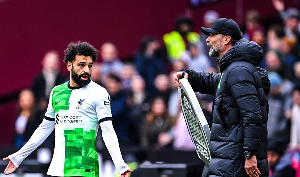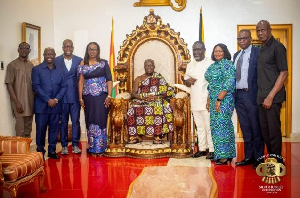- Home - News
- TWI News | TV
- Polls
- Year In Review
- News Archive
- Crime & Punishment
- Politics
- Regional
- Editorial
- Health
- Ghanaians Abroad
- Tabloid
- Africa
- Religion
- Election 2020
- Coronavirus
- News Videos | TV
- Photo Archives
- News Headlines
- Press Release
General News of Wednesday, 16 April 2003
Source: UN Integrated Regional Information Networks
Parents of "Enslaved" Fishing Boys Identified
Parents of 45 out of 1,200 children sold as child labourers in fishing communities of Ghana's Central and Volta regions were recently identified following a visit to four villages in the Central region by participants in a project to end child slavery, IOM said.
A team from the International Office for Migration (IOM) based in the towns of Yeji and Atebubu recently traveled to four villages in the Central region with six participating employers, locally known as "slave masters", in an effort to identify parents of children who were sold into slavery, IOM said reported on Tuesday.
The group traveled to Saafra, Winneba, Immuna and Ekumpoano - four villages from where the "slave masters" told IOM they had taken them.
"Initially, parents were afraid to come to us because they thought we were going to arrest them," IOM Project Coordinator Ernest Taylor was quoted as saying. "They knew they had done something wrong but later explained that dire poverty had driven them to sell their children. They said they had no other choice," he said.
"Once we explained how IOM was going to help them, dozens of parents came to us. We spread photos of the children on tables and parents pored over them to try and identify their missing children," he added. To make sure the identification process is accurate, IOM asks parents to name the children on the photos and the names they provide are matched against the names on the IOM database, IOM said.
In this first visit, some 45 children were identified by their parents. The first family reunification is expected in the coming weeks. It will allow children to return to school or join vocational training programmes being set up by IOM and its partners, the organisation said.
Poverty is to be addressed by giving parents access to income-generating micro-credit schemes, IOM said, adding that counselling, training and equipment would also be made available to the fishermen in exchange for the release of the children. IOM hoped that improved equipment and fishing methods would discourage the fishers from employing children in the future.
The IOM has registered more than 1,200 children who are currently employed under slave-like conditions. The victims, mostly boys aged between five and 14 years, are forced to work from dawn to dusk casting and drawing nets.
The project is funded by the United States and is being carried out in coordination with the Ghanaian authorities, the International Labour Organization (ILO), Catholic Relief Services and a local non-governmental organisation, APPLE.










